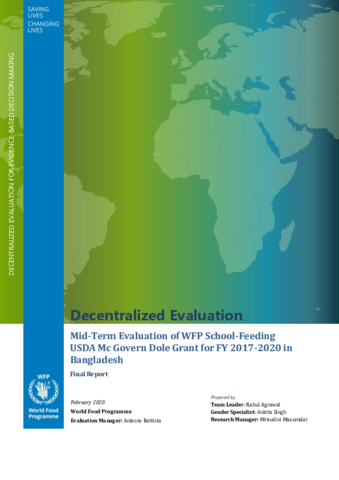
The USDA McGovern-Dole funded school feeding programme is designed to provide school feeding assistance in the form of micronutrient-fortified biscuits to pre-primary and primary school children in Ukhiya and Kutubdia upazilas (sub-districts) in Cox’s Bazar district of Bangladesh. Over three years, WFP with on-field assistance from implementing is carrying out project activities aiming to (i) increase student enrolment and student-teacher attendance through the provision of school meals and recognition of high-performing teachers, (ii) improve literacy of school-aged children and quality of education through early grade reading and other learning interventions, (iii) improve health and dietary practices of students by improving water systems and latrine facilities and through water, sanitation and hygiene education initiatives, (iv) increase government ownership through capacity building activities, and (v) increase awareness of the importance of education among parents and community members through ongoing advocacy campaigns.
The findings of this evaluation will primarily be used by (i) WFP Bangladesh and its implementing partners to adjust joint activities to implement the SFP and to inform future project design and implementation, (ii) USDA to inform changes in project strategy, results framework, and critical assumptions, (iii) Government of Bangladesh (GoB), head teachers and teachers as they are expected to eventually take over the management and monitoring of the SFP and (iv) other WFP offices like the Regional Bureau for wider organizational learning and accountability.
